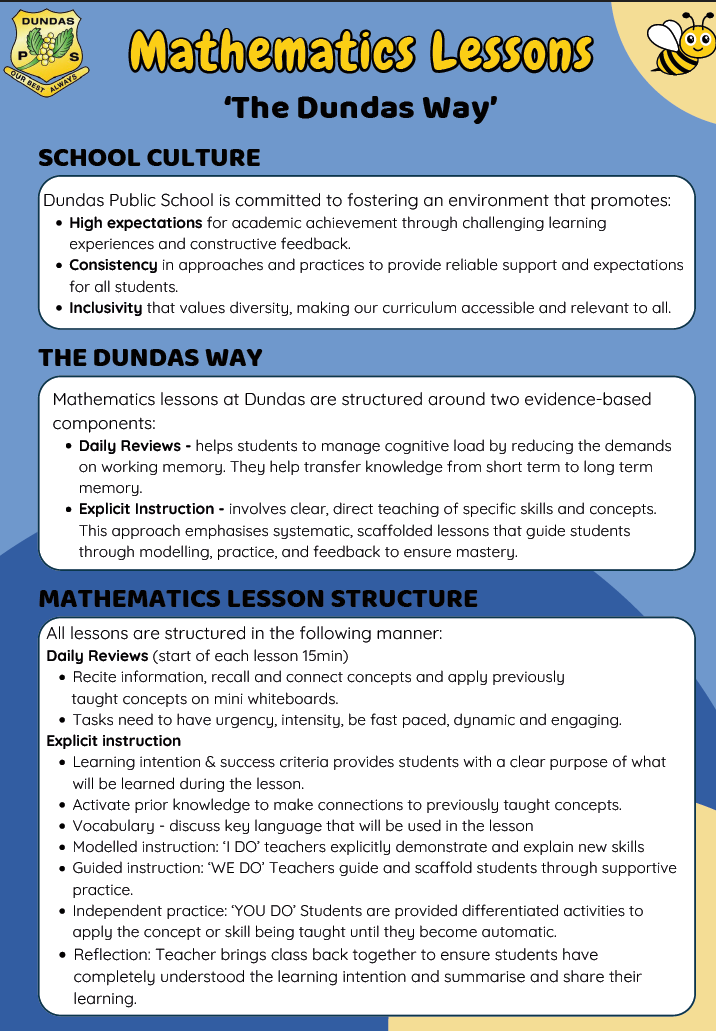Learning
At our school, we teach the NSW curriculum and offer many different subjects to support each student’s learning. We know that development of skills in literacy and numeracy are the building blocks for learning and for everyday life. Our teachers use effective teaching strategies to help students achieve their goals.
Why choose us for your child’s learning?
Strong foundations
We focus on the skills your child needs to succeed in school and beyond. This helps them feel confident and prepared for the future.
High-quality education
We offer a range of subjects to match what students enjoy and want to learn about. Our skilled teachers support every student to find what they love, do their best and succeed.
Inclusive and personalised learning
Our teachers adjust how they teach to suit your child’s needs, interests and learning pace. We make sure every student feels confident and supported.
Extension opportunities
Some students are ready for more challenges. We offer open-ended tasks, enrichment programs and support. We help all students to reach their full potential.
What students learn
Students learn a wide range of subjects in the NSW curriculum. They build skills, think creatively and prepare for life beyond school.
At our school, students can take part in special religious education (SRE) or special education in ethics (SEE) classes, depending on what’s available. These classes are delivered by approved providers.
When enrolling your child, you’ll be able to choose an option from the approved providers offered at our school. Students not attending SRE or SEE are given supervised alternative meaningful activities.
You’re welcome to change your choice at any time. Just let us know in writing or use the online form (if available at our school).
The following SRE classes are offered at Dundas Public School:
Catholic SRE is provided by the Archdiocese of Parramatta. More information about Catholic SRE including the authorised curriculum scope and sequence, please visit the Archdiocese of Parramatta https://ccd.sydneycatholic.org/publications/curriculum-resources/(opens in new window)
Protestant SRE is provided by Anglican Diocese of Sydney. More information about Protestant SRE including the authorised curriculum scope and sequence, please visit Anglican Diocese of Sydney https://youthworks.net/sre/curricula(opens in new window)
Muslim SRE is provided by Islamic Council of NSW. More information about Muslim SRE including the authorised curriculum scope and sequence, please visit the Islamic Council of NSW https://www.isre.org.au(opens in new window)
During the time that SRE classes are being held, students not attending will be located in a separate space and will participate in meaningful activities (acitivities could include reading, private study or completing homework).
For more information, visit the department’s website or contact us.
At our school, we give the right support to help advanced or talented learners grow and do their best.
We notice these students early. They may learn quickly or show strong skills in creativity, leadership, problem solving or sport. We help them stay challenged with lessons and activities that match their strengths.
Contact us to learn more about how we support high potential and gifted learners.

Our learning approach
Our school uses explicit teaching. This means we clearly tell students what they are learning, why it is important and how to do it step by step. Explicit teaching helps students understand new ideas by breaking them into smaller parts.
Learning at our school is student-centred, inclusive and practical. We are committed to equity and access. We support all learning styles and needs. Our teachers use proven teaching strategies. They take part in ongoing professional development to stay up to date with best teaching practice.
Our learning approach includes:
-
real-world learning: hands-on tasks, group work and exploring new ideas
-
technology: to help students learn and build digital skills
-
flexible teaching: the right support for each student, with a focus on wellbeing
-
community connections: through excursions and local programs.
'The Dundas Way'
English and mathematics are taught explicitly at Dundas Public School. Explicit teaching has been identified since 2015 in the Centre for Education Statistics and Evaluation (CESE) publication What Works Best: Evidence-based practices to help improve NSW student performance.
Evidence continues to support explicit teaching as a powerful practice. It works for students of all ages, and all backgrounds. It aligns with how students process, store and retrieve information.
Every student should experience explicit teaching when learning is new or complex. Explicit teaching allows students to gain foundational skills and knowledge. They can then apply their learning with greater independence.
Teachers use their expertise to select the right explicit teaching strategy at the right time for the right purpose.

Helping students progress
We support every student’s academic progress by:
- checking their progress and giving clear and timely feedback
- setting learning goals with each student
- giving extra help with personalised plans and support from specialist staff
- reporting on each student’s learning progress so parents and carers know how their child is doing
- providing targeted literacy and numeracy support in small groups
- making wellbeing part of everyday learning
- working with families to support learning at home and school
- helping students through transitions, like starting school or moving to a new stage of learning.
Learn more about additional learning support at our school.
Want to know more about our subjects?
We can connect you with the right teacher or staff member.
Student opportunities and activities
Discover clubs, sports and other activities your child can enjoy at school.
Our principal and staff
Get to know our principal and staff, who work together to create a positive school culture.